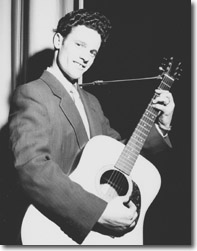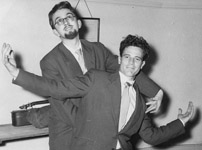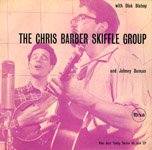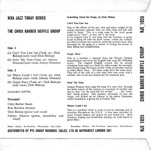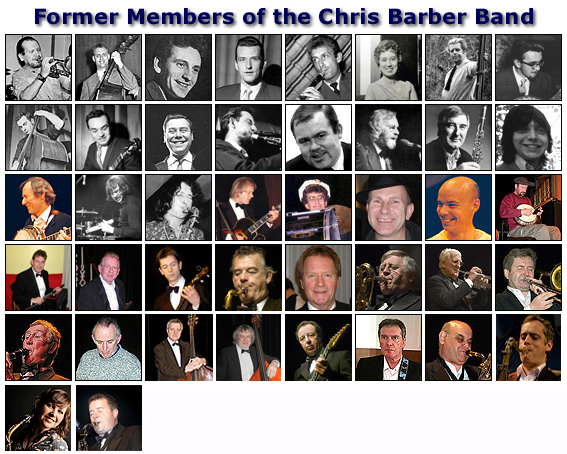 |
|||
Lonnie Donegan's last recordings with the Chris Barber Band, before he left to pursue a solo career capitalising on the success of "Rock Island Line", were made on 4 April 1956. He was replaced on banjo by Dick Bishop, who also soldiered on with the skiffle group (known both as Chris Barber's Skiffle Group and Dick Bishop's Skiffle Group). Lonnie's other replacement, a young American by the name of Johnny Duncan, seems to have joined the band almost by chance. There are, in fact, several slightly conflicting stories about how he came to be a member of the Chris Barber outfit. In one of the earliest Chris Barber Club booklets (Volume 1, Number 2), we read: "When our particular part of the jazz world was buzzing with the news of Lonnie Donegan's rapidly approaching visit to the States, Johnny Duncan walked onto the scene... He came into 100 Oxford Street one evening to see if there was any chance of 'sitting in' with the band some time, and conversation soon developed. We discovered him to be an American guitarist and folk singer, over here because his wife (who is British) had to have a heart operation. (Successful, we are glad to say). At home, Johnny was well-known in his native Knoxville, Tennessee, leading his own group, broadcasting, televising and recording. Here, he is now a member of Dickie Bishop's Skiffle Group, and hopes to do some recording in the fairly near future. Incidentally, we are told that skiffle is, to Johnny, 'Blue Grass Style' music, as it originated, and still exists, among the hillbilly folk of Kentucky's 'blue grass' area." In another account, "Dickie Bishop, banjoist with Chris Barber, says he invited Johnny along to the White Hart in Southall to meet with Barber after seeing Johnny perform at the American Club in Busbey Park." The same article also says, however:
Finally, Diana Robinson, who as Diana Gardner was the Barber Band's secretary at the time, tells the story this way:
Judging by a brief note in Chris Barber's letter in the very first edition of the series of Chris Barber Club booklets, and the fact that Johnny Duncan was the first member of the band to receive his own photo-feature (in Volume 1, Number 2), it seems as though Johnny Duncan's membership in the band was expected to be a long-term affair. However, it was not to be: although one gets the sense from various archival documents that there was personal friction, it's more likely that a combination of musical differences and Johnny's desire to follow in Lonnie's footsteps as a solo artist with his own band accounted for his relatively rapid departure. As Chris Barber remarked in a 1994 interview:
According to the Bielderman-Purser discography, Johnny played on only eight Barber tracks, six with the skiffle group and two (on guitar, accompanying Ottilie Patterson on piano) at the famous Royal Festival Hall concert on 15 December 1956. The front cover and sleeve notes for one of the records, a four-track, 7-inch EP by the Chris Barber Skiffle Group, are shown below. Most of Johnny's Barber recordings are now available on various CD reissues. For details about Johnny Duncan's recording career after he left the band, and his subsequent life in Australia, there is a great deal of information on the web, which you can find via the links towards the bottom of this page. Music: Doin' My Time (with the skiffle group, recorded 14 September 1956) and Bearcat Crawl (with Ottilie Patterson on piano and Chris Barber on bass, recorded 15 December 1956). |
|||
|
|||
| Links to Johnny Duncan information on the web: |
|||
| Back to the Former members of the band page. |
